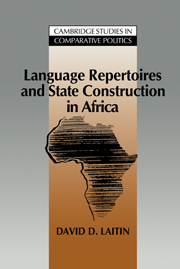Preface
Published online by Cambridge University Press: 03 May 2010
Summary
Language Repertoires and State Construction in Africa, relying on data about language interests, use, and change, draws the national outlines of Africa's future states. The analysis demonstrates that “language rationalization” (the emergence of a single, dominant language in each state, which becomes the official one for education, administration, and cultural life) will not be the typical pattern of African national development. Instead, for most of Africa the multilingual state will be the norm. The multilingual pattern there will not resemble that of Switzerland, Belgium, or Canada; it will have distinct parameters, caused by the particular constraints of building a postcolonial state in the twentieth century. Because African states will have a distinct pattern of national development in the course of state construction, political scientists need to ask what this pattern implies for economic growth, political stability, democratic structures, and political ideology. This book concentrates on the analysis of language change and provides only a preliminary assessment of the social, economic, and political implications of Africa's model of state construction. It attempts to make sense of the cacophony of voices demanding more rational language policies in Africa and offers modest suggestions about how some of the fervently expressed goals might be achieved without courting political chaos and further economic decline.
However great my commitment to speak to current issues in African affairs, this book was written primarily as a contribution to political science, through its use of game theory to analyze cultural politics and through its incorporation of historical variables to reveal distinct patterns of state construction.
- Type
- Chapter
- Information
- Language Repertoires and State Construction in Africa , pp. ix - xiiPublisher: Cambridge University PressPrint publication year: 1992

